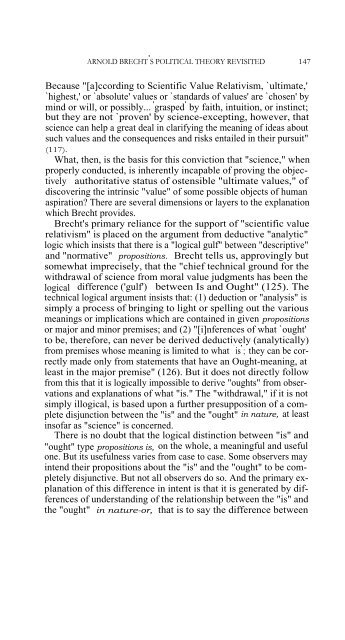ARNOLD BRECHT'S POLITICAL THEORY REVISITED Political ...
ARNOLD BRECHT'S POLITICAL THEORY REVISITED Political ...
ARNOLD BRECHT'S POLITICAL THEORY REVISITED Political ...
You also want an ePaper? Increase the reach of your titles
YUMPU automatically turns print PDFs into web optimized ePapers that Google loves.
<strong>ARNOLD</strong> BRECHT ' S <strong>POLITICAL</strong> <strong>THEORY</strong> <strong>REVISITED</strong> 147<br />
Because "[a]ccording to Scientific Value Relativism, `ultimate,'<br />
`highest,' or `absolute' values or `standards of values' are `chosen' by<br />
mind or will, or possibly... ' grasped ' by faith, intuition, or instinct;<br />
but they are not `proven' by science-excepting, however, that<br />
science can help a great deal in clarifying the meaning of ideas about<br />
such values and the consequences and risks entailed in their pursuit"<br />
(117).<br />
What, then, is the basis for this conviction that "science," when<br />
properly conducted, is inherently incapable of proving the objectively<br />
authoritative status of ostensible "ultimate values," of<br />
discovering the intrinsic "value" of some possible objects of human<br />
aspiration? There are several dimensions or layers to the explanation<br />
which Brecht provides.<br />
Brecht's primary reliance for the support of "scientific value<br />
relativism" is placed on the argument from deductive "analytic"<br />
logic which insists that there is a "logical gulf" between "descriptive"<br />
and "normative" propositions. Brecht tells us, approvingly but<br />
somewhat imprecisely, that the "chief technical ground for the<br />
withdrawal of science from moral value judgments has been the<br />
logical difference ('gulf') between Is and Ought" (125). The<br />
technical logical argument insists that: (1) deduction or "analysis" is<br />
simply a process of bringing to light or spelling out the various<br />
meanings or implications which are contained in given propositions<br />
or major and minor premises; and (2) "[i]nferences of what `ought'<br />
to be, therefore, can never be derived deductively (analytically)<br />
from premises whose meaning is limited to what ` is ' ; they can be correctly<br />
made only from statements that have an Ought-meaning, at<br />
least in the major premise" (126). But it does not directly follow<br />
from this that it is logically impossible to derive "oughts" from observations<br />
and explanations of what "is." The "withdrawal," if it is not<br />
simply illogical, is based upon a further presupposition of a complete<br />
disjunction between the "is" and the "ought" in nature, at least<br />
insofar as "science" is concerned.<br />
There is no doubt that the logical distinction between "is" and<br />
"ought" type propositions is, on the whole, a meaningful and useful<br />
one. But its usefulness varies from case to case. Some observers may<br />
intend their propositions about the "is" and the "ought" to be completely<br />
disjunctive. But not all observers do so. And the primary explanation<br />
of this difference in intent is that it is generated by differences<br />
of understanding of the relationship between the "is" and<br />
the "ought" in nature-or, that is to say the difference between
















